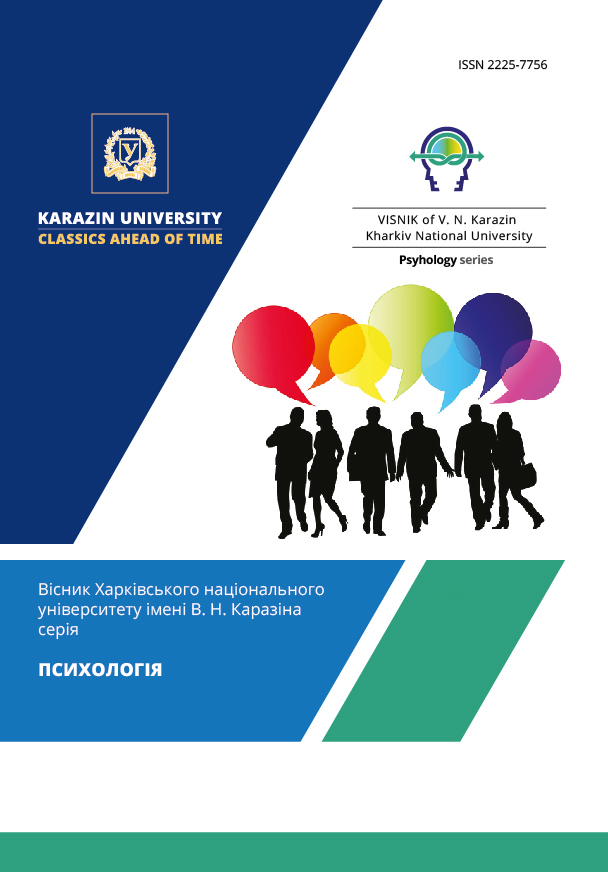Preverbal Traumas and Personality Hardiness
Abstract
The article analyzes the phenomenon of preverbal traumas - complex mental traumas received in early childhood, before the child learned to speak, and which personality cannot consciously reproduce, and also provides the results of an empirical study of the relationship of these traumas with hardiness and its main components (commitment, control and challenge) in students. The article is aimed at researching preverbal traumas, hardiness and factors affecting it, checking and revealing the nature of the relationship between the levels of development of preverbal traumas and the hardiness of students. The sample consisted of 62 students from various institutions of higher education in Ukraine, including 49 women and 13 men aged 18-22. To achieve the goal of the study, the following methods were used: «Diagnostic of confidence injuries according to the method of psychotherapy «i-reconstruction» (Pavlenko T.V.), «The short version of the test of hardiness» (V.A. Olefir, M.A. Kuznetsov, A.V. Pavlova), «Self-assessment of hardiness» (modification of the questionnaire M. Vorwerg on the contact of T. A. Larina). As a result of the study, a significant feedback of the average strength between the general indicators of preverbal trauma and hardiness, as well as the feedback of the average strength between the variables "preverbal trauma - control," "right to receive pleasure - control" and "right to receive pleasure - hardiness" were identified. This may indicate that a person who has preverbal traumas loses confidence that he can influence his own life and circumstances. Individuals who tend to develop a prohibition to receive pleasure are poorly able to control their lives and generally have poorly developed hardiness. With the severity of preverbal traumas, hardiness and its components are poorly developed. Accordingly, students who, on the contrary, have well-formed hardiness, have a low level of development of preverbal injuries. Further research of factors affecting the relationship of hardiness and preverbal traumas will allow to develop effective strategies for overcoming the consequences of preverbal traumas, increase psychological stability and promote normal development of personality.
Downloads
References
Bartone, P. T. (2023). Development and Validation of an Improved Hardiness Measure. European Journal of Psychological Assessment, 39(3), 222–239.
https://psycnet.apa.org/fulltext/2022-53058-001.pdf
Bartone, P. T. (2022). Hardiness moderates the effects of COVID-19 stress on anxiety and depression. Journal of Affective Disorders, 317, 236 244. https://www.ncbi.nlm.nih.gov/pmc/articles/PMC9398790/
Chykhantsova, O.A. (2016). Some aspects of studying the problem of hardiness personality. Actual problems of psychology: Collection of scientific papers of G.S.Кostiyk institute of psychology, T. VI. Psychology of giftedness, 12, 465-472. https://lib.iitta.gov.ua/708391/5/%D0%A7%D0%B8%D1%85%D0%B0%D0%BD%D1%86%D0%BE%D0%B2%D0%B0%20%D0%9E.pdf [in Ukrainian].
Finn, H., Warner, E., Price, M., Spinazzola, J. (2017). The Boy Who Was Hit in the Face: Somatic Regulation and Processing of Preverbal Complex Trauma. Journal of child & amp; adolescent trauma, 11(3), 277-288. https://pubmed.ncbi.nlm.nih.gov/32318157/
Ivashchenko, I. Yu. (2021). Relationship of hardiness with conscious choice life path in youth. Collection of scientific works of the National University " Kyiv-Mohyla Academy". https://ekmair.ukma.edu.ua/handle/123456789/20282 [in Ukrainian].
Levine, H. B. (2021). Further thoughts on trauma, process and representation. The American Journal of Psychoanalysis, 81(2), 164-177. https://www.researchgate.net/publication/351361183_FURTHER_THOUGHTS_ON_TRAUMA_PROCESS_AND_REPRESENTATION
McDonald, S. (2019). Co-Leading Trauma Groups Across Disciplines. In Healing Trauma in Group Settings Routledge, 90-101. https://www.taylorfrancis.com/chapters/edit/10.4324/9781315164120-6/co-leading-trauma-groups-across-disciplines-susan-mcdonald
Mikova, T. (2023). Parents' fantasy about the child's opposite sex and its influence on formation of preverbal trauma. Scientific perspectives, 12(31), 202-209. http://perspectives.pp.ua/index.php/vp/article/view/8191/8235 [in Ukrainian].
Olefir, O., Kuznietsov, M.A., Pavlova, A.V. (2013). The short version of the test of hardiness. H.S. Skovoroda Kharkiv National Pedagogical University, 8. [in Ukrainian].
Pavlenko, T.V. (2022). Diagnostic of confidence injuries according to the method of psychotherapy «I-reconstruction». Scientific method. Publication, K.: Publishing house of psychological literature "Psychobook", 25. http://perspectives.pp.ua/index.php/pis/article/view/3758/3778 [in Ukrainian].
Pavlenko, T.V. (2023). Understanding preverbal injuries by the method of psychotherapy "I-reconstruction". Actual problems of higher professional education, Kyiv, 85-88. https://er.nau.edu.ua/bitstream/NAU/59814/1/%d0%9f%d0%90%d0%92%d0%9b%d0%95%d0%9d%d0%9a%d0%9e%20%d0%a2%d0%b5%d1%82%d1%8f%d0%bd%d0%b0.pdf [in Ukrainian].
Reznikova, O. (2016). Psychology of traumatic situations: lecture course and instructional and methodical materials, a study guide. Еducational and methodological guide for applicants of the second (master's) level of specialty 053 "Psychology", Slavyansk, 26-29. https://ddpu.edu.ua/images/stories/news/2016/NMR/posibniki/PSH/Psihologiya%20travmuuchih%20situaciy.pdf [in Ukrainian].
Tytarenko, T. M., Laryna, T. O. (2009). Нardiness of the individual: social necessity and safety. K.: Marich, 30-61. https://lib.iitta.gov.ua/id/eprint/9065/1/Zhiznestoykost_lichnosti.pdf [in Ukrainian].
Varina, H. B. (2018). Нardiness of the individual as a psychological factor well-being of future psychologists. Modern science: trends and perspectives: materials of the All-Ukrainian Internet-conf. Melitopol state Bohdan Khmelnytskyi Pedagogical University, 28-34. http://eprints.mdpu.org.ua/id/eprint/3398/1/2-tmp8FEE-%D0%A1%D1%83%D1%87%D0%B0%D1%81%D0%BD%D0%B0%20%D0%BD%D0%B2%D1%83%D0%BA%D0%B0-%D0%92%D0%90%D0%91.pdf [in Ukrainian].




